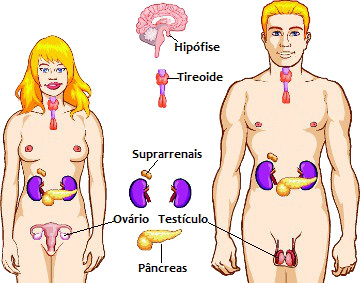You've probably heard someone talking about hormones. From minor emotions to severe illness, these substances influence every aspect of our lives. But, after all, what are hormones?
Hormones can be defined as chemical substances produced by endocrine glands. These glands have as main feature the release of secretions directly into the bloodstream that are taken to the various areas of the body.
Each hormone acts at a particular location, which can be specific cells or a particular organ known as a target organ. Upon reaching the site of action, the hormone activates or blocks the action of that structure, thus controlling its functioning. ANDbetween the functions developed by hormones, we can highlight the growth, development and internal balance of the body.
Each hormone is produced by a specific gland and acts only in a certain location. The set of endocrine glands in the body is called the endocrine system.

The human endocrine system is formed by the various existing endocrine glands
See below the main hormones in our body, the gland where they are produced and their function in the body:
Hormone |
Place where it is produced |
Occupation |
growth hormone or somatotrophin |
Hypophysis |
Promotes body growth. |
prolactin |
Hypophysis |
Stimulates milk production after childbirth. |
Oxytocin |
Hypophysis |
Contracts the uterus at the time of childbirth. |
Triiodothyronine (T3) and Thyroxine (T4) |
Thyroid |
It acts on the cell's metabolism. |
calcitonin |
Thyroid |
Promotes calcium deposition in bones. |
Insulin |
pancreas |
Allows the uptake of glucose by cells, decreasing its concentration in the blood. |
glucagon |
pancreas |
It breaks down glycogen in the liver, increasing blood glucose concentration. |
Adrenaline |
adrenal |
Speeds up heart rate. |
estrogen |
Ovary |
It promotes the development of a woman's secondary sexual characteristics, such as the enlargement of the hips and the growth of the breasts. |
progesterone |
Ovary |
Prepares a woman's body for pregnancy. |
Testosterone |
Testicle |
Responsible for the development of secondary human characters, such as the appearance of a beard, thickening of the voice and strengthening of muscles. |
Heads up: Any change in hormone levels can influence the functioning of the body, even causing diseases, such as diabetes. This illness is triggered by inadequate insulin production, which leads to the accumulation of glucose in the blood.
By Ma. Vanessa dos Santos


